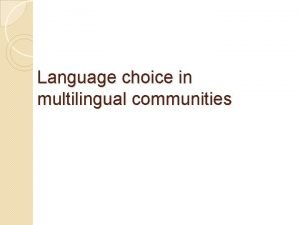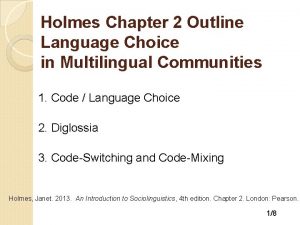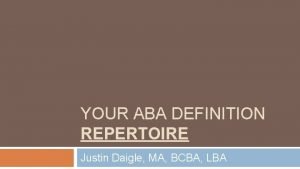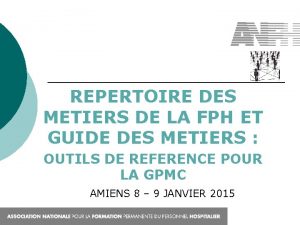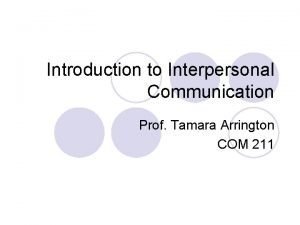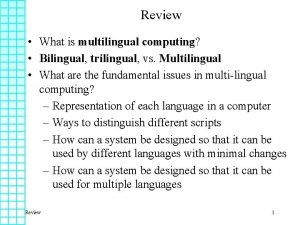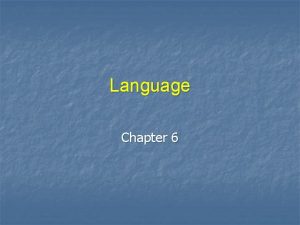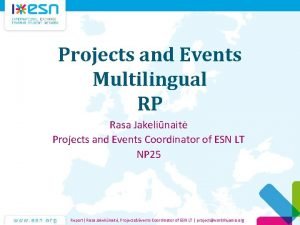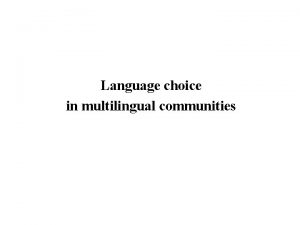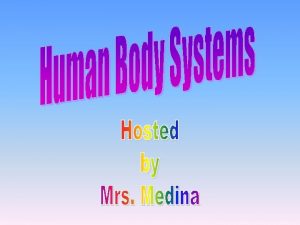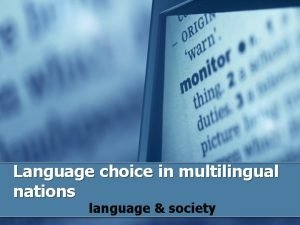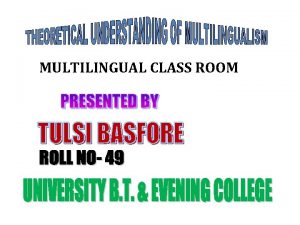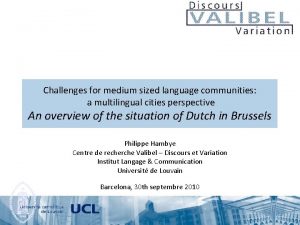Language choice in multilingual communities linguistic repertoire It


















- Slides: 18

Language choice in multilingual communities

*linguistic repertoire : �It is all the varieties of linguistic codes that a person has stored and used depending on different linguistic environments , contextual situations or speech communities.

Domain : �Domain is clearly a very general concept which draws on three important social factors in code choice , participants , setting and topic. According to Holmes , the linguistic forms chosen by a speaker is influenced by social context in which he is talking. it matters who he is talking to (participants) , where he is talking (setting) , what he is talking about (topic) , and why he is talking (function of interaction ). As a result , the same message may be expressed differently to different people.

Factors affecting code choice or code modification: 1/social distance which is the amount of acceptance and rejection between participants 1 -social status which is the social hieraechy within a society E. g. Jop titles or ranks 3 -formality 4 -function of a topic

Diglossia *THE TERM WAS INTRODUCED BY FERGUSON 1959, AND REFERS TO THE LANGUAGE SITUATION IN WHICH TWO VARIETIES OF THE SAME LANGUAGE IS USED IN DIFFERENT SITUATIONS. *A situation in which two languages (or two varieties of the same language) are used under different conditions within a community, often by the same speakers. The term is usually applied to languages with distinct “high” and “low” (colloquial) varieties, such as Arabic.

*superposed, standard, high variety. *it is used for litraly and litrary purposes and formal, public and official uses. *regional dialect , vernacular, low variety. *it is used for informal conversation and daily use.

*Latin was the H variety alongside daughter languages , such as italian, french and spanish, which had developed from its more colloquial form. In these communities , while the two varieties are linguistically related, the relationship is closer in some cases than others. the degree of difference in the pronunciation of H and L varies from place to place , for example, the sounds of swiss german are quite different from those of standard german. *The grammar of the two lingistically related varieties differs too.

*often the grammar of h is morphologically more complicated. for instance , standard german uses more case markers of nouns and tense inflections on verbs than swiss german. *most of the vocabulary of H and L is the same. but, it is used in more formal domains, the H vocabulary includes many more formal and technical terms while the L variety has words for everyday objects.

*diglossia has three crucial features: two distinct varities of the same language are used in the community, with one regarded as a H variety and the other L variety. 2. each variety is used for quite distinct functions H and L complement each other. 3. no one uses the H variety in evreyday conversation. 1.

Ferguson 1959: *Diglossic Languages have one variety that is used for ‘high’ (formal, literacy) purposes: the Hvariety, has the most prestige *This constrasts with the L-variety which is different phonologically, grammatically, lexically, and syntactically *L-variety is used for informal, mostly spoken purposes; lacks prestige, may be seen as ‘vulgar’ or ‘ungrammatical’; spoken ‘only by children, *lesser beings, uneducated people

Fishman’s extension Fishman (1967) extended diglossia to apply to situations where historically unrelated languages were used together, a prestige language for H, a colloquial one for L. FOR EXAMPLE , IN FISHMAN USAGE , EVEN MUILTILINGUAL COUNTRIES SUCH AS NIGERIA , WHERE ENGLISH FUNCTIONS AS A NATIONWIDE PRESTIGE LANGUAGE WHICH IS LEARNT IN SCHOOL AND LOCAL LANGUAGES HAUSA AND YORUBA ARE SPOKEN NATIVELY, ARE DESCRIBED AS BEING DIGLOSSIC.

Mutual intelligibility *May be lacking mutual intelligibility between the H-variety and the L-variety or varieties, especially with the Fishman kind of diglossia! *People who know only H can’t understand L; people who know one L-variety can’t understand others, e. g. Arabic dialects from the Maghreb to Yemen or Dubai *H-variety and L-varieties are said to control ‘domains’

Code-switching Definition of code switching: Code-switching may apply to bilingual and multilingual speech situations.

purpose of code-switching:

Factors affecting codeswitching *The topic: *For affective functions: patois/standard English=switching*Situational Switching: occurs when the speaker changes the language because of the change in the situation. e. g: One language is used in one situation (for example during a breakfast with the family members) the other in a different one (e. g. in government offices *Lexical borrowing: This switching is used due the lack of vocabulary of the primary language used to describe something. -all these have been suggested as factors that motivate people in code-switch. The motivation may not be conscious. -In some extreme cases, people may not even be aware they have code-switched.

Metaphorical switching *occurs when a change of the topic of the discourse requires a change in the language used. *Thus, a language used in a situation which is different from the one it is usually used in, because the topic of the conversation is one that is associated with the situation it is usually used in. For instance, a language which is usually used at home is occasionally heard in a government office, because the topic that the participants are discussing is associated with home.

Borrowings Borrowing usually occurs when the speaker does not know a suitable equivalent for the borrowed item in the first language. The borrowed word is part of the lexicon of the first language. The borrowed items are almost always single words—usually, bur not exclusively, nouns — and are adapted to the first language in their pronunciation, morphology and grammar. An example of a borrowing into Arabic is the word ‘baguette' from the French "baguette" (sandwich) or the word ‘mgripi’ from the French word "grippe" (influenza, or flu).

*In code-switching, people switch not because they cannot come up with an item in one of the codes; they switch codes for important social considerations. *They switch from one code to another completely—in pronunciation, morphology, grammar and vocabulary. There is no modification or adaptation to the rules of the other code. *Scholars assert that borrowings are morphologically and syntactically integrated into the host language but code switches are not.
 Code mixing examples
Code mixing examples Language
Language Linguistic varieties and multilingual nations
Linguistic varieties and multilingual nations Type of succession
Type of succession Ncil and aba
Ncil and aba Répertoire des métiers fph
Répertoire des métiers fph Certificate of merit piano level 10 repertoire
Certificate of merit piano level 10 repertoire A large repertoire of skills
A large repertoire of skills Which factor characterizes masspersonal communication?
Which factor characterizes masspersonal communication? Good choice or bad choice
Good choice or bad choice Multilingual e learning
Multilingual e learning Multilingual app toolkit
Multilingual app toolkit Multilingual computing
Multilingual computing Fertile crescent
Fertile crescent Multilingual literacy sife screener
Multilingual literacy sife screener Dialect ap human geography
Dialect ap human geography Multilingual product information
Multilingual product information Rasa multilingual
Rasa multilingual Pie multilingual services
Pie multilingual services
